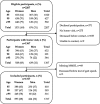The association between cognition and gait in a representative sample of very old people - the influence of dementia and walking aid use
- PMID: 32005103
- PMCID: PMC6995040
- DOI: 10.1186/s12877-020-1433-3
The association between cognition and gait in a representative sample of very old people - the influence of dementia and walking aid use
Abstract
Background: Cognition has been related with gait speed in older adults; however, studies involving the oldest age group, where many have mobility disability and cognitive impairment, are few. The aim was to investigate the association between global cognitive function and gait speed in a representative sample of very old people, and whether the association was affected by dementia, and walking aid use.
Method: This cross-sectional study included 1317 participants, mean age 89.4 years, and 68% women, from the Umeå85+/Gerontological Regional Database. Self-paced gait speed was measured over 2.4 m, with or without walking aids, and global cognitive function with the Mini-Mental State Examination (MMSE). The association between cognition and gait speed was analyzed using multiple linear regression and stratified according to dementia. The influence of missing gait speed values was explored using multiple imputation. An interaction analysis was performed to investigate the influence of walking aid use.
Results: In comprehensively adjusted analyses, MMSE associated with gait speed (unstandardized β (β) 0.011 m/s, 95% Confidence Interval [CI] = 0.009, 0.013, p < 0.001) in the total sample. No association was found in people with dementia (β 0.003 m/s, 95%CI = 0.000, 0.006, p = 0.058), until missing gait speed values were compensated for by multiple imputation (β 0.007 m/s, 95% [CI] = 0.002, 0.011, p = 0.002). In interaction analysis the use of walking aids attenuated the association between cognition and gait speed (β - 0.019 m/s, 95%CI = - 0.024, - 0.013, p < 0.001).
Conclusion: Global cognitive function appears to associate with gait speed in very old people. However, in people with dementia selection bias was indicated since unless missing gait speed values were accounted for no association was observed. Walking aid use attenuated cognitive load, which may not apply to walking in daily activities, and requires further investigation.
Keywords: Aged 80 and over; Cognition; Dementia; Gait speed; Walking aids.
Conflict of interest statement
The authors declare that they have no competing interests.
Figures


Similar articles
-
Cognitive function and walking velocity in people with dementia; a comparison of backward and forward walking.Gait Posture. 2017 Oct;58:481-486. doi: 10.1016/j.gaitpost.2017.09.009. Epub 2017 Sep 9. Gait Posture. 2017. PMID: 28926815
-
Gait speed in older people: an easy test for detecting cognitive impairment, functional independence, and health state.Psychogeriatrics. 2016 May;16(3):165-71. doi: 10.1111/psyg.12133. Epub 2015 Jun 26. Psychogeriatrics. 2016. PMID: 26114989
-
Baseline Association of Motoric Cognitive Risk Syndrome With Sustained Attention, Memory, and Global Cognition.J Am Med Dir Assoc. 2018 Jan;19(1):53-58. doi: 10.1016/j.jamda.2017.07.016. Epub 2017 Sep 9. J Am Med Dir Assoc. 2018. PMID: 28899662
-
The Association Between Gait Speed and Cognitive Status in Community-Dwelling Older People: A Systematic Review and Meta-analysis.J Gerontol A Biol Sci Med Sci. 2019 May 16;74(6):943-948. doi: 10.1093/gerona/gly140. J Gerontol A Biol Sci Med Sci. 2019. PMID: 29917045
-
Measuring gait speed to better identify prodromal dementia.Exp Gerontol. 2019 Sep;124:110625. doi: 10.1016/j.exger.2019.05.014. Epub 2019 Jun 4. Exp Gerontol. 2019. PMID: 31173841 Review.
Cited by
-
Gait variability predicts cognitive impairment in older adults with subclinical cerebral small vessel disease.Front Aging Neurosci. 2022 Nov 18;14:1052451. doi: 10.3389/fnagi.2022.1052451. eCollection 2022. Front Aging Neurosci. 2022. PMID: 36466602 Free PMC article.
-
Low grip strength and gait speed as markers of dependence regarding basic activities of daily living: the FIBRA study.Einstein (Sao Paulo). 2024 May 24;22:eAO0637. doi: 10.31744/einstein_journal/2024AO0637. eCollection 2024. Einstein (Sao Paulo). 2024. PMID: 38808796 Free PMC article.
-
Change in gait speed and fall risk among community-dwelling older adults with and without mild cognitive impairment: a retrospective cohort analysis.BMC Geriatr. 2023 May 25;23(1):328. doi: 10.1186/s12877-023-03890-6. BMC Geriatr. 2023. PMID: 37231344 Free PMC article.
-
The Association Between Mild Cognitive Impairment and Physical Function in Older Japanese Adults Aged 75 Years or Older Living in Independent Senior Housing: A Cross-Sectional Study.Healthcare (Basel). 2024 Oct 23;12(21):2106. doi: 10.3390/healthcare12212106. Healthcare (Basel). 2024. PMID: 39517319 Free PMC article.
-
The Bidirectional Association Between Cognitive Function and Gait Speed in Chinese Older Adults: Longitudinal Observational Study.JMIR Public Health Surveill. 2023 Mar 14;9:e44274. doi: 10.2196/44274. JMIR Public Health Surveill. 2023. PMID: 36917163 Free PMC article.
References
-
- United Nations . Department of Economic and Social Affairs. World Population Ageing: Population Division; 2015.
-
- Abellan Van Kan G, Rolland Y, Andrieu S, Bauer J, Beauchet O, Bonnefoy M, et al. Gait speed at usual pace as a predictor of adverse outcomes in community-dwelling older people an International Academy on Nutrition and Aging (IANA) Task Force. J Nutr Health Aging. 2009;13:881–889. doi: 10.1007/s12603-009-0246-z. - DOI - PubMed
Publication types
MeSH terms
Grants and funding
LinkOut - more resources
Full Text Sources
Medical

